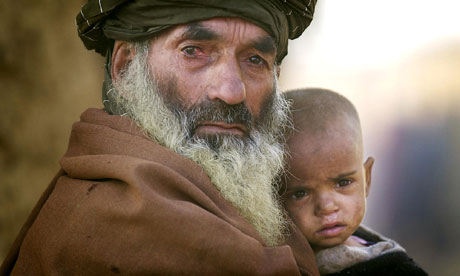
-
Saturday 12 February 2011 06.30 GMT
- Article history

History sometimes circles around. Sixty years ago today the Guardian published a letter from Victor Gollancz calling for an end to a world of "poverty and militarism". From that letter grew the charity War on Want. Now that same organisation writes in the same spirit, calling for the withdrawal of British troops from Afghanistan. I hope it will be as effective as its predecessor.
I have had a long association with War on Want. The late Donald Chesworth, a London Labour man to his radical roots, was responsible for getting me actively involved, years ago. We were both working on various projects in Notting Hill, where I was a curate in a local parish. He was doing his best to heal a community shattered by the race riots of the early 1960s and was on the board of War on Want.
The stars of the day in War on Want were people like Canon Austen Williams of St Martins-in-the-Fields, Dr David Kerr, a south London GP, and Michael Barnes MP. The powerful, inspirational, but dominating administrator at the centre of it all was Frank Harcourt-Munning. To do him justice, Frank did much imaginative work and even saved War on Want in 1954, when the new organisation was on the edge of financial collapse. It has been on that edge many times since.
In 1969 I had seen in person the deaths of many innocent victims of the starvation embargo imposed on Biafra during the Nigerian civil war. As a result I became convinced that to deal with symptoms of injustice and not with its causes is to short-change the poor of this world. That is why I have stuck with War on Want. It has always made causes not symptoms its priority.
The most famous of its radical reports, The Baby Killer – about the powdered milk industry – was published in 1974. But it was only one of a series of powerful exposés of economic exploitation.
War on Want has never been afraid of challenging the timid. When the other agencies in Calcutta, during the civil war and refugee crisis of 1971, hesitated to use the name Bangladesh instead of East Pakistan, War on Want showed no such political prudence. In fact, the number of times the organisation has had to face Charity Commission examinations should be listed on its letterhead as a mark of honour.
Most impressive to me is its willingness to make it clear that war and militarism cannot be treated as a separate issue by any NGO dealing seriously with poverty. War on Want was involved in the 1970s in the newly created Campaign Against Arms Trade, now one of the most effective British campaigning groups.
Why not? Stopping a war was one of the two aims demanded in that launching letter 60 years ago. Letters that reflect public consensus have political power as did that one from Victor Gollanz all those years ago. I hope this current one will bring to an end our part in a war which we cannot win, did not authorise, and has resulted in endless loss of life

No comments:
Post a Comment